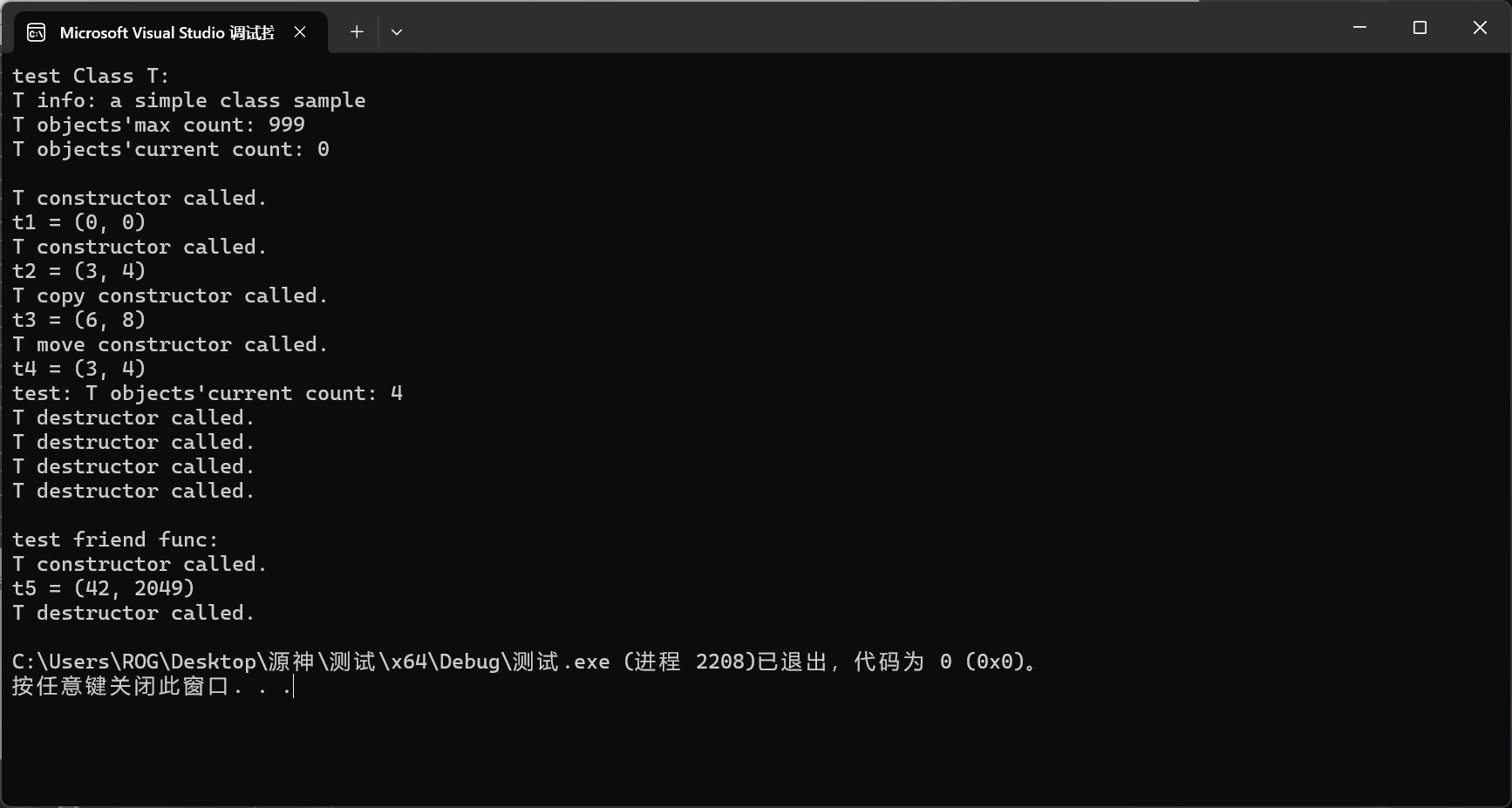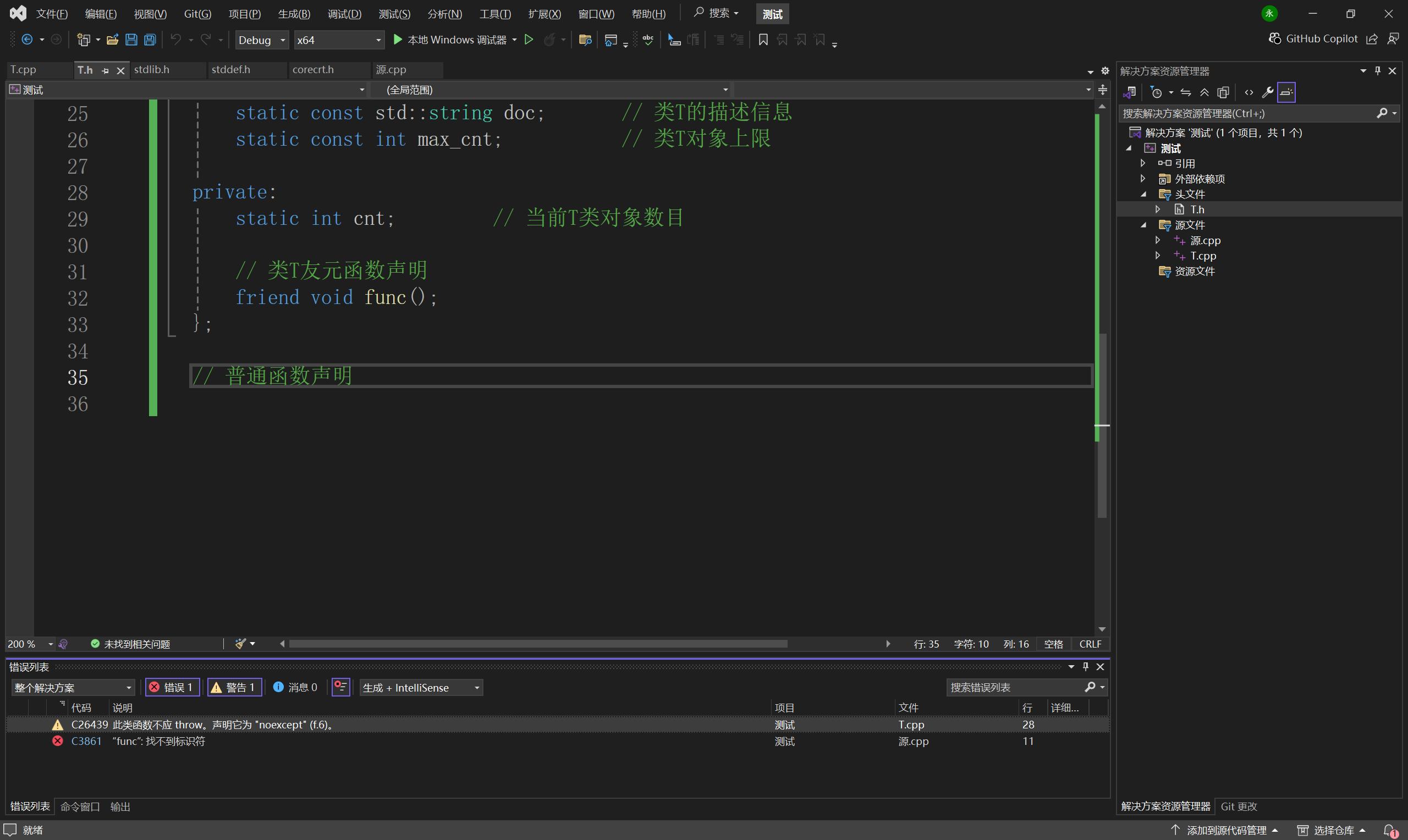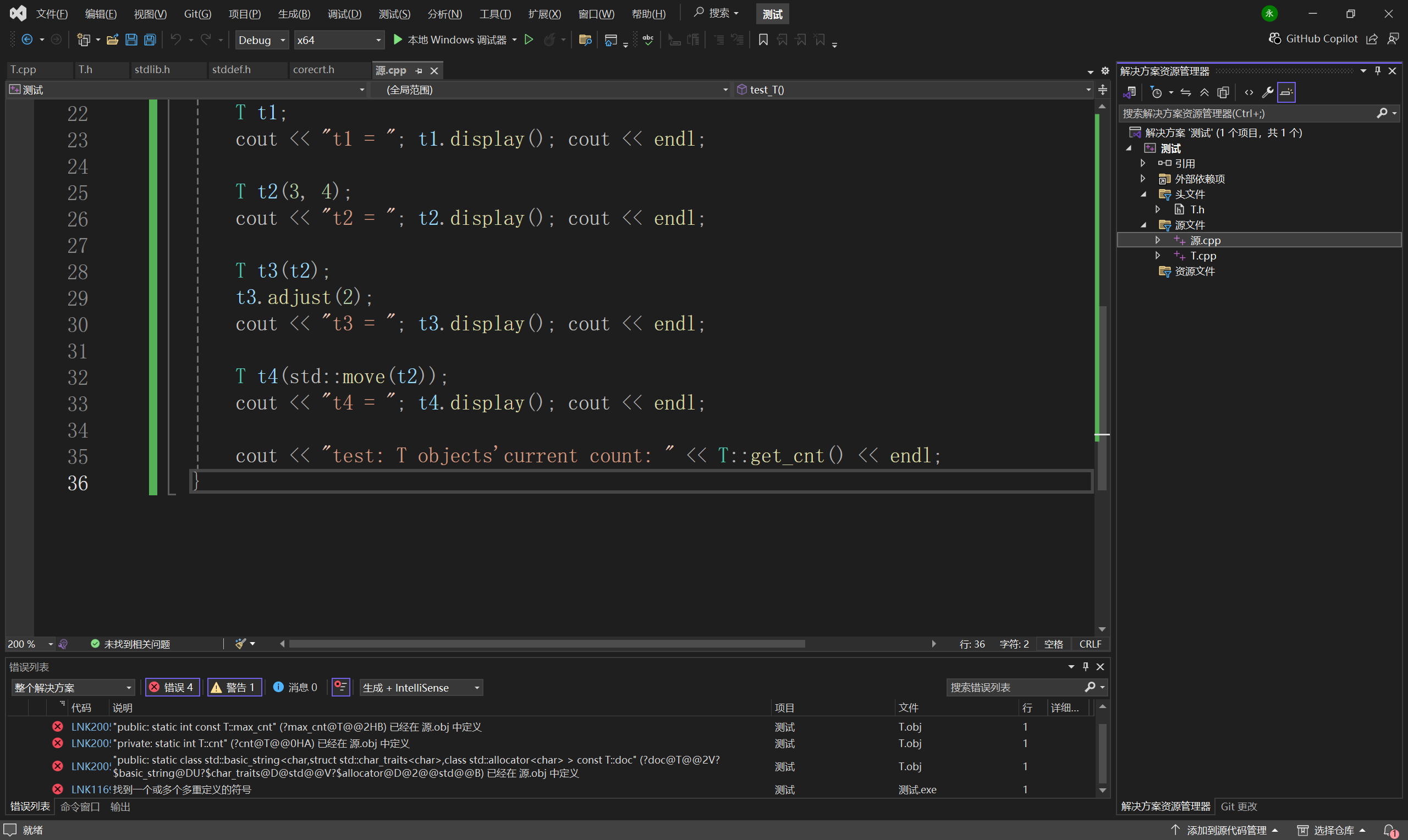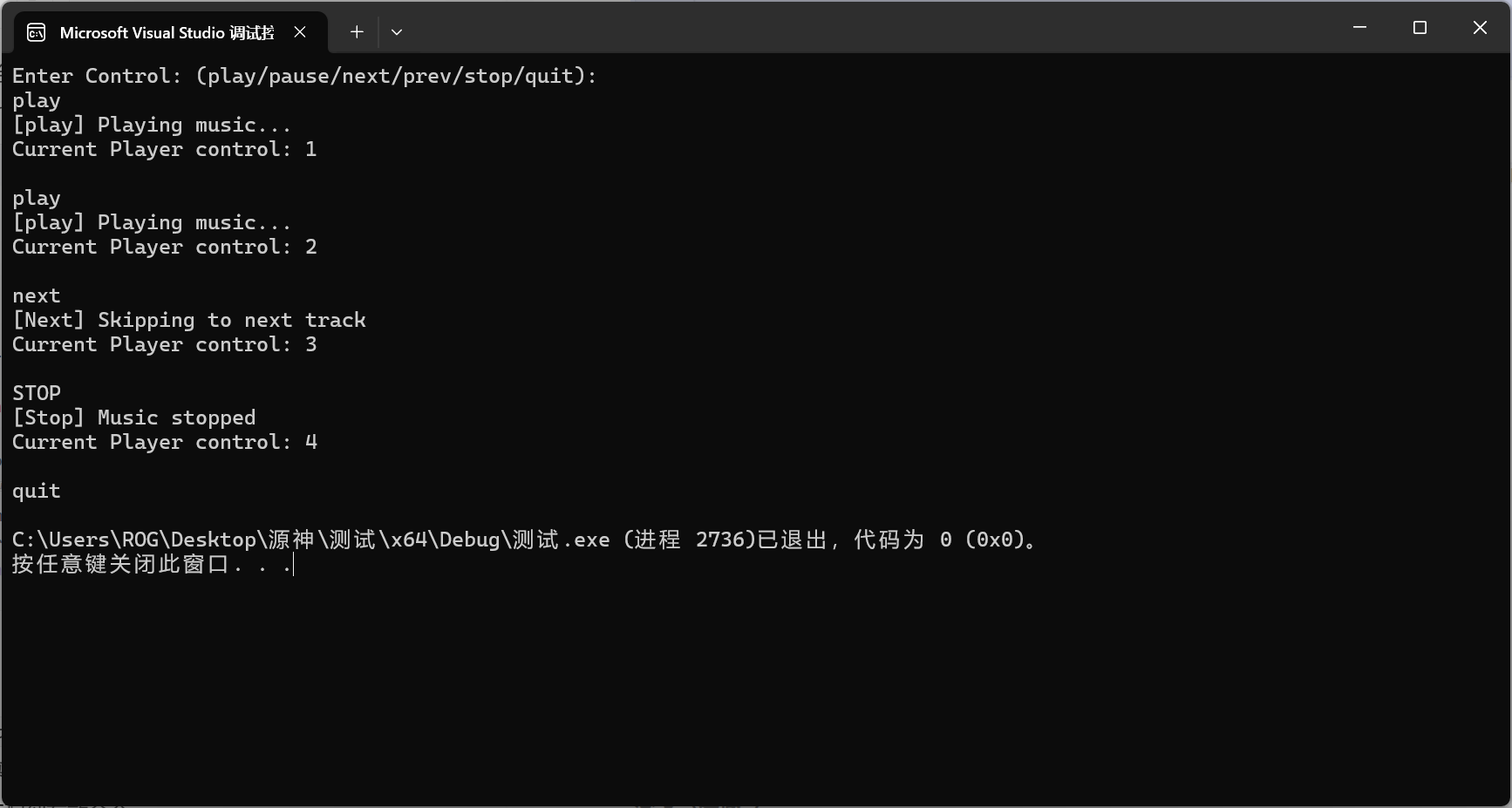实验二
任务一
代码

#pragma once #include <string> // 类T: 声明 class T { // 对象属性、方法 public: T(int x = 0, int y = 0); // 普通构造函数 T(const T &t); // 复制构造函数 T(T &&t); // 移动构造函数 ~T(); // 析构函数 void adjust(int ratio); // 按系数成倍调整数据 void display() const; // 以(m1, m2)形式显示T类对象信息 private: int m1, m2; // 类属性、方法 public: static int get_cnt(); // 显示当前T类对象总数 public: static const std::string doc; // 类T的描述信息 static const int max_cnt; // 类T对象上限 private: static int cnt; // 当前T类对象数目 // 类T友元函数声明 friend void func(); }; // 普通函数声明 void func();

#include "T.h" #include <iostream> #include <string> // 类T实现 // static成员数据类外初始化 const std::string T::doc{"a simple class sample"}; const int T::max_cnt = 999; int T::cnt = 0; // 类方法 int T::get_cnt() { return cnt; } // 对象方法 T::T(int x, int y): m1{x}, m2{y} { ++cnt; std::cout << "T constructor called.\n"; } T::T(const T &t): m1{t.m1}, m2{t.m2} { ++cnt; std::cout << "T copy constructor called.\n"; } T::T(T &&t): m1{t.m1}, m2{t.m2} { ++cnt; std::cout << "T move constructor called.\n"; } T::~T() { --cnt; std::cout << "T destructor called.\n"; } void T::adjust(int ratio) { m1 *= ratio; m2 *= ratio; } void T::display() const { std::cout << "(" << m1 << ", " << m2 << ")" ; } // 普通函数实现 void func() { T t5(42); t5.m2 = 2049; std::cout << "t5 = "; t5.display(); std::cout << '\n'; }

1 #include "T.h" 2 #include <iostream> 3 4 void test_T(); 5 6 int main() { 7 std::cout << "test Class T: \n"; 8 test_T(); 9 10 std::cout << "\ntest friend func: \n"; 11 func(); 12 } 13 14 void test_T() { 15 using std::cout; 16 using std::endl; 17 18 cout << "T info: " << T::doc << endl; 19 cout << "T objects'max count: " << T::max_cnt << endl; 20 cout << "T objects'current count: " << T::get_cnt() << endl << endl; 21 22 T t1; 23 cout << "t1 = "; t1.display(); cout << endl; 24 25 T t2(3, 4); 26 cout << "t2 = "; t2.display(); cout << endl; 27 28 T t3(t2); 29 t3.adjust(2); 30 cout << "t3 = "; t3.display(); cout << endl; 31 32 T t4(std::move(t2)); 33 cout << "t4 = "; t4.display(); cout << endl; 34 35 cout << "test: T objects'current count: " << T::get_cnt() << endl; 36 }
效果

问题
1.

不行,在作用域内没有声明func函数, 因为 func() 是类外定义的友元函数,必须先声明.
2.
普通构造:分配内存并初始化成员;创建新T对象且传整型参数时调用。
复制构造:拷贝对象;用已有对象初始化新对象时调用。
移动构造:转移资源;用右值初始化时调用。
析构:释放内存并清理;对象生存期结束时调用。
3.

不能正确编译,会报多重定义错误。原因是类的静态成员定义应放在.cpp文件,若剪切到.h头文件,多文件包含时会重复定义。
任务二
代码

#pragma once #include <string> class Complex { public: static const std::string doc; public: Complex() : real(0.0), imag(0.0) {} Complex(double real_val) : real(real_val), imag(0.0) {} Complex(double real_val, double imag_val) : real(real_val), imag(imag_val) {} Complex(const Complex& other) : real(other.real), imag(other.imag) {} public: double get_real() const { return real; } double get_imag() const { return imag; } void add(const Complex& other) { real += other.real; imag += other.imag; } public: friend void output(const Complex& c); friend double abs(const Complex& c); friend Complex add(const Complex& c1, const Complex& c2); friend bool is_equal(const Complex& c1, const Complex& c2); friend bool is_not_equal(const Complex& c1, const Complex& c2); private: double real; double imag; };

#include "Complex.h" #include <iostream> #include <cmath> const std::string Complex::doc = "a simplified complex class"; void output(const Complex& c) { if (c.imag >= 0) { std::cout << c.real << "+" << c.imag << "i"; } else { std::cout << c.real << c.imag << "i"; } } double abs(const Complex& c) { return sqrt(c.real * c.real + c.imag * c.imag); } Complex add(const Complex& c1, const Complex& c2) { return Complex(c1.real + c2.real, c1.imag + c2.imag); } bool is_equal(const Complex& c1, const Complex& c2) { return (c1.real == c2.real) && (c1.imag == c2.imag); } bool is_not_equal(const Complex& c1, const Complex& c2) { return !is_equal(c1, c2); }

#include "Complex.h" #include <iostream> #include <iomanip> #include <complex> void test_Complex(); void test_std_complex(); int main() { std::cout << "*******测试1: 自定义类Complex*******\n"; test_Complex(); std::cout << "\n*******测试2: 标准库模板类complex*******\n"; test_std_complex(); } void test_Complex() { using std::cout; using std::endl; using std::boolalpha; cout << "类成员测试: " << endl; cout << Complex::doc << endl << endl; cout << "Complex对象测试: " << endl; Complex c1; Complex c2(3, -4); Complex c3(c2); Complex c4 = c2; const Complex c5(3.5); cout << "c1 = "; output(c1); cout << endl; cout << "c2 = "; output(c2); cout << endl; cout << "c3 = "; output(c3); cout << endl; cout << "c4 = "; output(c4); cout << endl; cout << "c5.real = " << c5.get_real() << ", c5.imag = " << c5.get_imag() << endl << endl; cout << "复数运算测试: " << endl; cout << "abs(c2) = " << abs(c2) << endl; c1.add(c2); cout << "c1 += c2, c1 = "; output(c1); cout << endl; cout << boolalpha; cout << "c1 == c2 : " << is_equal(c1, c2) << endl; cout << "c1 != c2 : " << is_not_equal(c1, c2) << endl; c4 = add(c2, c3); cout << "c4 = c2 + c3, c4 = "; output(c4); cout << endl; } void test_std_complex() { using std::cout; using std::endl; using std::boolalpha; cout << "std::complex<double>对象测试: " << endl; std::complex<double> c1; std::complex<double> c2(3, -4); std::complex<double> c3(c2); std::complex<double> c4 = c2; const std::complex<double> c5(3.5); cout << "c1 = " << c1 << endl; cout << "c2 = " << c2 << endl; cout << "c3 = " << c3 << endl; cout << "c4 = " << c4 << endl; cout << "c5.real = " << c5.real() << ", c5.imag = " << c5.imag() << endl << endl; cout << "复数运算测试: " << endl; cout << "abs(c2) = " << abs(c2) << endl; c1 += c2; cout << "c1 += c2, c1 = " << c1 << endl; cout << boolalpha; cout << "c1 == c2 : " << (c1 == c2) << endl; cout << "c1 != c2 : " << (c1 != c2) << endl; c4 = c2 + c3; cout << "c4 = c2 + c3, c4 = " << c4 << endl; }
效果


问题
1.标准库complex更简洁,因重载运算符,操作形式同普通运算;自定义用函数调用。二者功能一致,形式差异源于运算符重载。
2-1:是,因需访问私有成员。
2-2:不是,标准库通过public成员函数访问数据。
2-3:非成员函数需访问类私有或者保护成员时用友元,平衡功能与数据保护。
3.将类Complex的复制构造函数声明为delete,即Complex(const Complex&) = delete;。
任务三
代码

#pragma once #include <string> enum class ControlType { Play, Pause, Next, Prev, Stop, Unknown }; class PlayerControl { public: PlayerControl(); ControlType parse(const std::string& control_str); // 实现std::string --> ControlType转换 void execute(ControlType cmd) const; // 执行控制操作(以打印输出模拟) static int get_cnt(); private: static int total_cnt; };

#include "PlayerControl.h" #include <iostream> #include <algorithm> #include <cctype> // 用于字符小写转换 int PlayerControl::total_cnt = 0; PlayerControl::PlayerControl() {} ControlType PlayerControl::parse(const std::string& control_str) { // 转换输入字符串为小写,实现大小写不敏感 std::string lower_cmd = control_str; std::transform(lower_cmd.begin(), lower_cmd.end(), lower_cmd.begin(), [](unsigned char c) { return std::tolower(c); }); // 匹配有效命令并处理计数 if (lower_cmd == "play") { total_cnt++; return ControlType::Play; } else if (lower_cmd == "pause") { total_cnt++; return ControlType::Pause; } else if (lower_cmd == "next") { total_cnt++; return ControlType::Next; } else if (lower_cmd == "prev") { total_cnt++; return ControlType::Prev; } else if (lower_cmd == "stop") { total_cnt++; return ControlType::Stop; } else { return ControlType::Unknown; } } void PlayerControl::execute(ControlType cmd) const { switch (cmd) { case ControlType::Play: std::cout << "[play] Playing music...\n"; break; case ControlType::Pause: std::cout << "[Pause] Music paused\n"; break; case ControlType::Next: std::cout << "[Next] Skipping to next track\n"; break; case ControlType::Prev: std::cout << "[Prev] Back to previous track\n"; break; case ControlType::Stop: std::cout << "[Stop] Music stopped\n"; break; default: std::cout << "[Error] unknown control\n"; break; } } int PlayerControl::get_cnt() { return total_cnt; }

#include "PlayerControl.h" #include <iostream> void test() { PlayerControl controller; std::string control_str; std::cout << "Enter Control: (play/pause/next/prev/stop/quit):\n"; while (std::cin >> control_str) { if (control_str == "quit") break; ControlType cmd = controller.parse(control_str); controller.execute(cmd); std::cout << "Current Player control: " << PlayerControl::get_cnt() << "\n\n"; } } int main() { test(); }
效果

任务四
代码

#pragma once #include <string> #include <iostream> class Fraction { private: int up; int down; void simplify(); public: static const std::string doc; Fraction(int u); Fraction(int u, int d); Fraction(const Fraction& other); int get_up() const; int get_down() const; Fraction negative() const; }; namespace FracCal { namespace Internal { int gcd(int a, int b); } void output(const Fraction& f); Fraction add(const Fraction& f1, const Fraction& f2); Fraction sub(const Fraction& f1, const Fraction& f2); Fraction mul(const Fraction& f1, const Fraction& f2); Fraction div(const Fraction& f1, const Fraction& f2); }

#include "Fraction.h" #include <cmath> const std::string Fraction::doc{ "Fraction类 v 0.01版. 目前仅支持分数对象的构造、输出、加/减/乘/除运算." }; void Fraction::simplify() { if (down == 0) return; if (down < 0) { up *= -1; down *= -1; } int g = FracCal::Internal::gcd(std::abs(up), std::abs(down)); if (g != 0) { up /= g; down /= g; } } Fraction::Fraction(int u) : up(u), down(1) { simplify(); } Fraction::Fraction(int u, int d) : up(u), down(d) { simplify(); } Fraction::Fraction(const Fraction& other) : up(other.up), down(other.down) { } int Fraction::get_up() const { return up; } int Fraction::get_down() const { return down; } Fraction Fraction::negative() const { return Fraction(-up, down); } namespace FracCal { namespace Internal { int gcd(int a, int b) { a = std::abs(a); b = std::abs(b); while (b != 0) { int temp = b; b = a % b; a = temp; } return a; } } void output(const Fraction& f) { if (f.get_down() == 0) { std::cout << "分母不能为0"; } else if (f.get_up() == 0) { std::cout << 0; } else if (f.get_up() % f.get_down() == 0) { std::cout << f.get_up() / f.get_down(); } else { std::cout << f.get_up() << "/" << f.get_down(); } std::cout << std::endl; } Fraction add(const Fraction& f1, const Fraction& f2) { int common_down = f1.get_down() * f2.get_down() / Internal::gcd(f1.get_down(), f2.get_down()); int new_up = f1.get_up() * (common_down / f1.get_down()) + f2.get_up() * (common_down / f2.get_down()); return Fraction(new_up, common_down); } Fraction sub(const Fraction& f1, const Fraction& f2) { int common_down = f1.get_down() * f2.get_down() / Internal::gcd(f1.get_down(), f2.get_down()); int new_up = f1.get_up() * (common_down / f1.get_down()) - f2.get_up() * (common_down / f2.get_down()); return Fraction(new_up, common_down); } Fraction mul(const Fraction& f1, const Fraction& f2) { int new_up = f1.get_up() * f2.get_up(); int new_down = f1.get_down() * f2.get_down(); return Fraction(new_up, new_down); } Fraction div(const Fraction& f1, const Fraction& f2) { if (f2.get_up() == 0) { return Fraction(0, 0); } int new_up = f1.get_up() * f2.get_down(); int new_down = f1.get_down() * f2.get_up(); return Fraction(new_up, new_down); } }

#include "Fraction.h" #include <iostream> void test1(); void test2(); int main() { std::cout << "测试1: Fraction类基础功能测试\n"; test1(); std::cout << "\n测试2: 分母为0测试: \n"; test2(); } void test1() { using std::cout; using std::endl; cout << "Fraction类测试: " << endl; cout << Fraction::doc << endl << endl; Fraction f1(5); Fraction f2(3, -4); Fraction f3(-18, 12); Fraction f4(f3); cout << "f1 = "; FracCal::output(f1); cout << "f2 = "; FracCal::output(f2); cout << "f3 = "; FracCal::output(f3); cout << "f4 = "; FracCal::output(f4); const Fraction f5(f4.negative()); cout << "f5 = "; FracCal::output(f5); cout << "f5.get_up() = " << f5.get_up() << ", f5.get_down() = " << f5.get_down() << endl; cout << "f1 + f2 = "; FracCal::output(FracCal::add(f1, f2)); cout << "f1 - f2 = "; FracCal::output(FracCal::sub(f1, f2)); cout << "f1 * f2 = "; FracCal::output(FracCal::mul(f1, f2)); cout << "f1 / f2 = "; FracCal::output(FracCal::div(f1, f2)); cout << "f4 + f5 = "; FracCal::output(FracCal::add(f4, f5)); } void test2() { using std::cout; using std::endl; Fraction f6(42, 55); Fraction f7(0, 3); cout << "f6 = "; FracCal::output(f6); cout << "f7 = "; FracCal::output(f7); cout << "f6 / f7 = "; FracCal::output(FracCal::div(f6, f7)); }
效果

问题
1. 设计方案:命名空间+自由函数
2. 决策理由:
避免友元破坏封装,通过`get_up()`/`get_down()`访问数据即可;
比静态成员函数更灵活,不使`Fraction`类职责过载,维护性强。
3. 方案对比:友元:快捷但耦合高;
静态成员函数:类内过载;
命名空间+自由函数:封装好、易维护,适配分数运算场景。


 浙公网安备 33010602011771号
浙公网安备 33010602011771号